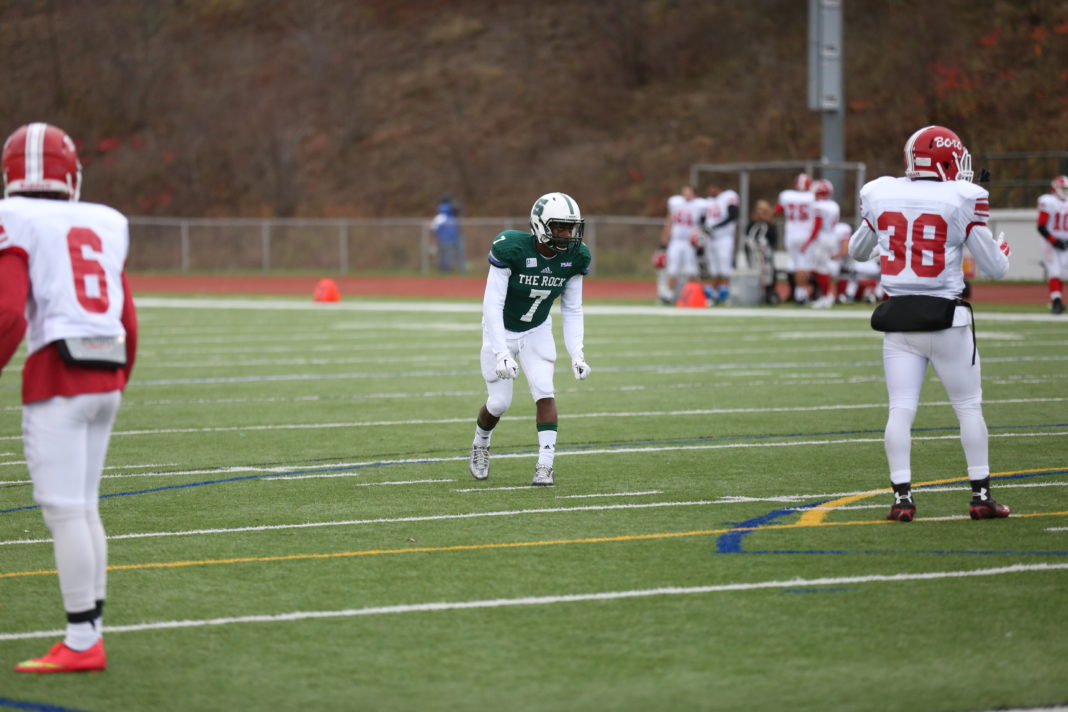“I can tell you what I remember,” the voice says over speaker phone. “A lot of that day, I don’t remember.”
Ironically, in the courageous act for which many now recognize him, former Slippery Rock wideout Jaimire Dutrieuille calls to mind only an instinctive lunge.
It was a seasonably warm and sunny day, he recalls. He’d punched out from work shortly before stopping at a friend’s on his way home. There, Dutrieuille sat on the porch, his back turned to the street behind him. He talked to the friend and asked the friend’s nine-year-old niece, Merajzha, how school was going.
From accounts described to him, Jaimire says that a car rolled past the home, then made a U-turn back toward it. The assailants hopped out of the car and began running down a hill, guns drawn.
“My boy, I guess, he sees what was going on […] and he says something to me, but, I don’t know if I didn’t hear him or if I wasn’t paying attention, so I didn’t really react,” Dutrieuille says. “I was probably confused because I didn’t know what he was talking about.”
Rightfully so, Dutrieuille says, the friend fled into his home, his infant son in his arms.
“When he runs in the house, they start shooting at the porch,” Dutrieuille says. “When I hear the shots go off […] I probably could’ve jumped over his bannister and ran down the street and [been] perfectly fine.”
Instead, he grabbed the young girl in front of him and shielded her.
“I didn’t want nothing to happen to her,” he says. “I have little sisters and I have a mom. If my mom or little sisters [were] in that situation, I would want somebody to do the same for them […] It was a little girl. She doesn’t deserve to be in that situation.”
Jaimire was struck by three bullets, one of which hit his head. Sent into shock, he sidestepped the immediate anguish of being shot. He came to in a hospital bed at UPMC Presbyterian.
One of the shots shattered his elbow. Another punctured his buttocks, grazing his Sciatic nerve and injuring his hips to the extent where he’d have to re-learn how to walk.
“To be doing something your whole life and then to wake up and not be able to do it,” Dutrieuille says, “it was weird.”
He’d pushed through the pain of a sprained foot before, but he’d never dealt with something like this.
Slippery Rock, Dutrieuille says, was the only program to give him a worthwhile shot to play at a college level. Lock Haven also expressed interest, but the Bald Eagles were in the midst of a Div. II-record 52-game losing streak.
“There was no way I was going to Lock Haven,” Dutrieuille says. “So, I took my visit up to Slippery Rock, and when I took my visit up to Slippery Rock, I didn’t know nothing about Slippery Rock. I didn’t even know Slippery Rock was a school and, mind you, I live in Pittsburgh.”
He and his mom made the drive from North Braddock, getting lost in the process. Almost immediately, he felt a connection with the team and its players. SRU it was.
A two-time All-PSAC West selection, Dutrieuille played in 47 games at Slippery Rock, starting 30 of them. He completed his career at the Rock ranked fifth in receiving yards (2,177), and third in both receptions (172) and receiving scores (20).
Including former teammates, he had someone to keep him company every day of the month-plus that he was bedridden in the hospital, distracting him from the environment he was in.
“Outside of my mom and my dad, I had somebody on my team or a family friend come visit me,” Dutrieuille says. “And it wasn’t just come and say ‘hi,’ people were spending hours upon hours with me. Just getting that love and people checking on me, sending me text messages, [and] giving me calls […] I didn’t really have time to actually process what I’d went through.”
While family and friends passed through, conversations with an SRU head coaching icon stood out most. Jaimire, who completed his classes in 2015, had been unable to lock down an internship. George Mihalik, who won 197 contests on the Rock’s sidelines and claimed eight division titles, wanted to help.
“When I was in the hospital—of course, [Coach Mihalik] came to visit me a couple of times—he made me make a promise to him,” Dutrieuille says.
Mihalik, once a professor in the department that concentrated on Dutrieuille’s major, knew that his former player needed only four more credits for his degree. Dutrieuille vowed to him that he would finish his schooling when healed, and he to his wideout that he would make the process of re-admitting easier.
This winter, Mihalik dialed Dutrieuille to follow up, asking if he was ready to return to school. Along with some of Dutrieuille’s old professors, he encouraged Dutrieuille to open the books again, even convincing some people he knew to gift scholarship money so that the receiver wouldn’t have to pay out of his pocket to finish.
“It was a team effort for everybody to get me back into school,” Dutrieuille says. “With things like that, how could I not love Slippery Rock forever?”
Merajzha, still experiencing trauma from the incident, preferred not to see the man who saved her life in such a condition.
“She didn’t want to come to the hospital and see me like that, because I had tubes and stuff all on me and wasn’t walking,” Dutrieuille says. “You know, I wasn’t looking the same. I lost a lot of weight. Her mom would show her pictures of me and she just couldn’t fathom the fact of seeing me like that.”
A week or two after Jaimire could go home, they finally reunited.
“The smile she gave me, the hug she gave me, it was just amazing,” Dutrieuille says.
Also sometime after Dutrieuille’s discharge from the hospital, another familiar name called with something in mind. Jon Holtz, SRU’s director of athletic communication, was nominating Jaimire for the NCAA Award of Valor.
“In my head, I was like, ‘What’s the chance of them really recognizing me?’” Dutrieuille says. “I never in a million years thought it was going to happen.”
He was excited, but wasn’t yet acquainted with the honor. He looked into the history of the award, which is only presented when deemed worthy.
“The requirements basically say that, when faced with a situation involving danger and extenuating circumstances, a person goes above and beyond to […] protect others from any kind of harm,” Holtz says. “That certainly fit his description.”
The nomination was submitted to the NCAA over the summer and, during the fall, Holtz was told that Dutrieuille was going to receive the honor.
“Never in a million years did I think I would be on a stage that big from that incident,” Dutrieuille says. “Of course, I [saw] myself [in that way] sports-wise, if I made it that far. But, from this incident, I never thought [any of the attention] was going to come out of it. I just thought, you know, I did what I did.”
Even with the spotlight, the gunmen were never so much as identified, let alone apprehended. This comes as no big surprise to Jaimire. At first, he dealt with anxiety, aware that his aggressor was still out there. He could walk by the person on the street on the South Side, he says, and would never know.
“Living where I live at, when stuff like that happens, most times, most people don’t get caught, anyway,” Dutrieuille says, irritated.
His relationship with the friend wouldn’t be the same as before. The two, Dutrieuille says, didn’t speak much after the shooting.
“It’s not like I dislike him or don’t still have love for him or anything,” he says. “It’s just, I can’t put myself in that situation again […] Some of the people I grew up with, maybe I shouldn’t always be hanging with.”
Jaimire has his sights set on starting a non-profit to steer the youth in his area onto better paths. Before COVID-19, he’d mentored children up to three times a week through Team Braddock, an organization that lets kids stay active through athletics.
“Being from the area and [having done] the things the kids [do], it’s my due diligence to get out there and try to make a change,” Dutrieuille says.
One of the bullets hit Dutrieuille in his optic nerve, and the lack of peripheral vision in his right eye hampers him most. He can still put up shots on a basketball hoop and he can still reel in a football, albeit, he admits, not at the level he once could.
“I’m going to take that for the good in the situation,” Dutrieuille says. “I saved somebody’s life, so not too many people get to say that.”









